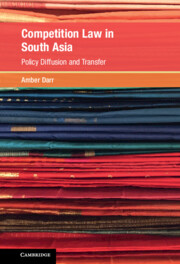
- Publisher:
- Cambridge University Press
- Online publication date:
- February 2023
- Print publication year:
- 2023
- Online ISBN:
- 9781009247184


In the last twenty years, South Asian countries have increasingly engaged with modern competition legislation. Yet, apart from India and Pakistan, the countries in this region have had little success enforcing these laws. Competition Law in South Asia analyses the mechanisms and institutions through which Bangladesh, Bhutan, India, Pakistan, Maldives Nepal, Sri Lanka, and Afghanistan have engaged with modern competition legislation. The book argues that the success (or failure) of competition reform in these countries is inextricably linked to the unique interplay of mechanisms and legal and political institutions through which these countries have engaged with competition legislation. The book provides an in-depth comparative analysis of the adoption and implementation continuum in India and Pakistan, the compatibility and legitimacy generated by the adoption process, and its impact on implementation. Taking a far-reaching, comparative approach, the book draws lessons not only for countries in South Asia but also for emerging economies across the globe.
‘Amber Darr's convincing analysis of the legal, economic, and political determinants of the successes and failures of competition laws in different South Asian countries is a must for any reader wishing to gain a deeper understanding of how competition laws are adapted to their national landscapes.'
Frédéric Jenny - Hauser Global Professor of Antitrust Law, New York Law School; Chairman, OECD Competition Committee
‘This splendid book provides for the first time a coherent account of the development of competition law and policy in South Asia, not only in India and Pakistan but in six other countries in the region. Amber Darr's excellent scholarship will benefit all observers of the subject in this complex and fascinating part of the world.'
Richard Whish - Professor of Law, King's College London
‘Competition Law in South Asia is a seminal work in understanding the origins of competition laws and the impact those origins have on the enforcement thereof in South Asia. The book is a must read for the competition officials and competition law practitioners of countries with young competition regimes – not just those of South Asia.'
Joseph Wilson - Former Chairman, Competition Commission of Pakistan
‘In this lucidly-written book, Amber Darr shows how the process by which competition laws are adopted in new jurisdictions significantly influences the extent and manner of their enforcement. She draws coherent lessons from the experiences of eight South Asian countries at different stages of the ‘deliberation-enactment-implementation' continuum and provides valuable suggestions for the future. This pathbreaking work will be an asset to scholars and practitioners both within and outside the region.'
Aditya Bhattacharjea
‘Darr's account of the development of competition law with a solid theoretical foundation in the legal transplant literature and New Institutional Economics is a very important book about the spread and adoption of competition law. And there is no better person than Amber Darr to write it. The book is a must-read for anyone interested in the emergence and development of competition law in South Asia and developing countries in general.'
Thomas Cheng - Associate Professor of Law, University of Hong Kong
 Loading metrics...
Loading metrics...
* Views captured on Cambridge Core between #date#. This data will be updated every 24 hours.
Usage data cannot currently be displayed.